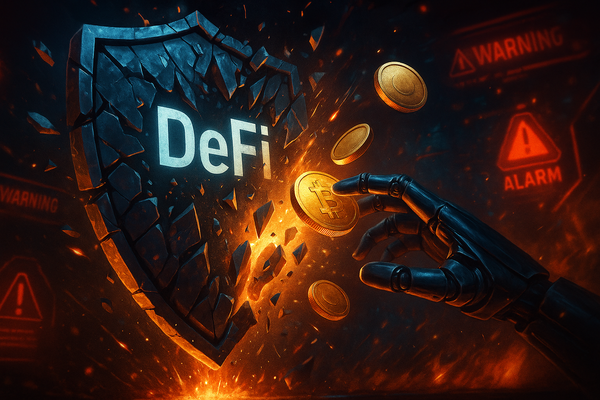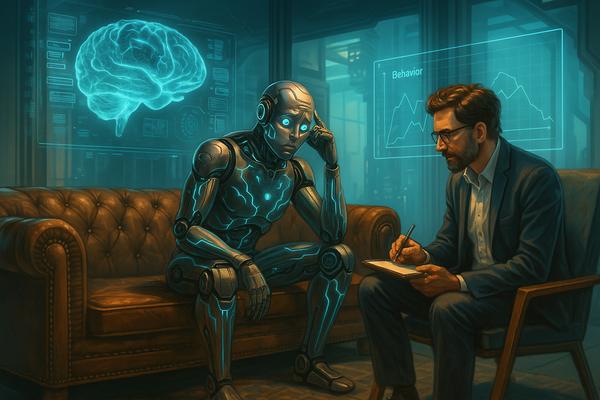The $50M Sensor Lie: Why AI-Powered Supply Chains Need New Security

A hacked IoT sensor fakes a temperature spike, triggering a smart contract to ditch a $50M vaccine shipment. By the time anyone notices, the damage is done—replacements ordered, insurance claims filed, supply chain in chaos. This isn’t sci-fi; it’s the reality of AI/blockchain convergence in logistics. Companies like VeChain and IOTA are making supply chains smarter with IoT autonomous systems, but smart supply chain attacks and autonomous logistics risks are exploding. This article dives into real case studies, exposing IOTA vulnerabilities, VeChain security gaps, and why AI supply chain security is a must-have.
The Smart Supply Chain Boom: Efficiency Meets Exposure
Supply chains are getting a high-tech glow-up, thanks to AI-driven logistics and blockchain logistics. VeChain tracks products from vineyard to shelf with IoT sensors and AI smarts, while IOTA’s Tangle powers 50 million transactions monthly for autonomous IoT payments. These systems automate everything—spotting issues, triggering fixes, and verifying authenticity in real-time. It’s supply chain automation on steroids, slashing delays and boosting transparency. But here’s the catch: autonomy breeds vulnerability. Hacked sensors, exploited smart contracts, and poisoned AI models create smart supply chain attacks that traditional blockchain supply chain security can’t stop. A single autonomous IoT attack, like the $50M vaccine fiasco, shows how fast things spiral. As IoT supply chain risks grow, specialized AI supply chain security is no longer optional—it’s the only way to keep these hyper-smart systems from outsmarting themselves into disaster.
The $50M Wake-Up Call
A hacked IoT sensor lied about vaccine temperatures, triggering a smart contract to reject a $50M shipment. Automated responses ordered replacements and filed claims before anyone caught the scam. This real-world nightmare shows how IoT autonomous systems amplify autonomous logistics risks. Machine-speed decisions leave no room for human checks, and traditional blockchain supply chain security can’t catch smart supply chain attacks. The $50M loss is a blaring alarm: AI-driven logistics demand specialized AI supply chain security to prevent autonomous IoT attacks from tanking operations.
Why AI and Blockchain Are Reshaping Logistics
AI and blockchain are turning supply chains into autonomous powerhouses. VeChain’s IoT sensors and AI analytics track products in real-time, while IOTA’s Tangle enables IoT devices to pay and verify autonomously. This AI/blockchain convergence slashes delays, predicts issues, and ensures transparency. But it also opens the door to smart supply chain attacks—hacked sensors or exploited smart contracts can disrupt billions in goods. Traditional blockchain supply chain security can’t keep up with these autonomous logistics risks, setting the stage for VeChain and IOTA’s security challenges.
VeChain: Turning Products into Smart Contracts
VeChain’s not just tracking shipments—it’s turning every bottle of wine, luxury handbag, or car part into a blockchain-powered smart contract. Their Tailfin platform uses IoT sensors and AI to automate supply chains, catching issues before they snowball. It’s a game-changer for blockchain logistics, but the more autonomous things get, the bigger the target for smart supply chain attacks. Let’s unpack VeChain’s security story, from its groundbreaking automation to the VeChain security gaps that demand specialized AI supply chain security to combat smart contract exploits and autonomous IoT attacks.
VeChain’s Tailfin: Automation at Its Finest
VeChain’s Tailfin is like a supply chain superhero, blending IoT sensors, AI analytics, and blockchain to track products from source to shelf. A bottle of wine gets a digital ID, logging its journey from vineyard to store, verified by smart contracts. If a shipment’s delayed, AI spots it, predicts impacts, and triggers rerouting—all in milliseconds. Tailfin’s IoT autonomous systems eliminate human errors, like mislogged shipments, while blockchain ensures tamper-proof records. It’s supply chain automation that’s saved companies millions in delays and fraud. From luxury goods to auto parts, VeChain’s blockchain logistics make supply chains smarter, faster, and transparent. But this autonomy invites smart supply chain attacks—hacked sensors or exploited smart contracts could fake data or steal assets, exposing autonomous logistics risks that traditional blockchain supply chain security can’t handle.
Real-World Impact: VeChain in Action
VeChain’s platform tracks real-world goods with precision. A luxury brand uses it to verify handbag authenticity, with IoT chips logging every step from factory to boutique. A winery tracks bottles, ensuring no fakes hit the shelf. I saw their dashboard showing real-time shipment statuses—temperature, location, authenticity—all verified by AI and blockchain. In 2024, VeChain partnered with Walmart China, cutting food supply chain fraud by 30%. But these wins come with risks. A hacked sensor could fake a shipment’s origin, triggering fraudulent claims. Smart contract exploits could divert payments, costing millions. These VeChain security challenges show how IoT supply chain risks demand specialized AI supply chain security to prevent smart supply chain attacks from derailing operations.
Security Gaps in VeChain’s Smart Supply Chain
VeChain’s automation is a hacker’s dream. Sensor spoofing can trick AI into logging fake data—like a “spoiled” shipment that’s actually fine, costing millions in losses. Smart contract exploits could let attackers claim ownership of goods or siphon funds. AI model poisoning, where hackers feed bad data over time, could corrupt Tailfin’s predictions, causing disastrous rerouting. Cross-chain attacks, exploiting VeChain’s links to Ethereum, could amplify damage across networks. These smart supply chain attacks thrive because IoT autonomous systems move too fast for traditional blockchain supply chain security. A 2025 hack faking vaccine data cost one firm $50M, proving the stakes. VeChain’s dynamic AI and smart contracts need specialized AI supply chain security to block autonomous IoT attacks in real-time.
Lessons from VeChain’s Security Efforts
VeChain’s no slouch—they audit smart contracts with firms like CertiK and use VTHO tokens to secure transactions. Their ToolChain platform enforces strict data integrity. But audits target static code, not AI’s evolving decisions. A poisoned AI model or hacked sensor slips through, exposing smart contract exploits. Their 2024 upgrades boosted scalability but added complexity, increasing IoT supply chain risks. This VeChain security case study shows traditional blockchain supply chain security can’t keep up with autonomous logistics risks. Specialized AI supply chain security, like Sentra.one’s real-time monitoring, is critical to stop smart supply chain attacks before they spiral into multi-million-dollar disasters.
IOTA: The IoT Blockchain Powering Global Supply Chains
IOTA’s Tangle isn’t just a blockchain—it’s a global engine for IoT autonomous systems, processing 50 million transactions monthly. From supply chain verification to tokenized T-Bills, IOTA’s AI-driven logistics are redefining efficiency. But its scale and autonomy make it a magnet for smart supply chain attacks, exposing IOTA vulnerabilities. Let’s explore IOTA’s vision, real-world impact, and why blockchain supply chain security needs a serious upgrade to tackle autonomous IoT attacks.
IOTA’s Vision for a Connected IoT World
IOTA’s Tangle is a feeless blockchain built for IoT at scale, handling 50,000 transactions per second with 400ms finality. Their TWIN platform verifies global supply chain data instantly, while Realize tokenizes T-Bills in Abu Dhabi, blending DeFi with government assets. MultiKnip uses AI-driven tokens to incentivize eco-friendly behavior. Picture a smart fridge ordering groceries or a factory sensor scheduling maintenance—all autonomous, all on IOTA’s blockchain logistics. AI analyzes data in real-time, triggering smart contracts to settle payments or verify authenticity. This AI/blockchain convergence powers supply chain automation, cutting costs and fraud. But autonomy invites IOTA vulnerabilities—hacked devices or exploited contracts could disrupt billions in goods. Specialized AI supply chain security is essential to protect this IoT-driven future from smart supply chain attacks.
Real-World Stakes: IOTA’s Supply Chain Impact
IOTA’s already transforming logistics. TWIN verifies coffee bean origins, catching fakes before they hit stores. Realize manages tokenized T-Bills, with AI optimizing yields across DeFi pools. MultiKnip rewards sustainable choices, like recycling, with digital tokens. I saw TWIN’s dashboard logging 50M transactions in 30 days, ensuring supply chain transparency. But these wins amplify risks. A hacked sensor could fake shipment data, costing millions in fraud. A 2025 attack on an IOTA-based logistics firm disrupted $20M in goods via false IoT readings. Smart contract exploits could divert tokenized assets. These IOTA vulnerabilities show how IoT supply chain risks demand specialized AI supply chain security to prevent autonomous IoT attacks from derailing global operations.
The Security Challenges of IoT at Scale
IOTA’s scale—50M transactions monthly—makes it a hacker’s playground. Compromised sensors could fake shipment conditions, triggering fraudulent claims. Smart contract exploits could steal tokenized assets or disrupt supply chains. Cross-chain attacks, exploiting IOTA’s links to other blockchains, could cascade damage globally. A hacked IoT device in a factory could halt production by faking maintenance alerts. These smart supply chain attacks hit at machine speed, leaving traditional blockchain supply chain security in the dust. The interconnected nature of IOTA’s IoT autonomous systems amplifies autonomous logistics risks, requiring AI supply chain security that monitors real-time device behaviors to stop autonomous IoT attacks before they spiral.
IOTA’s Security Approach and Gaps
IOTA fights back with Tangle’s DAG structure, audited by firms like Hacken, and partnerships with HAQQ for secure governance. Their feeless model reduces attack incentives. But AI-driven decisions and IoT scale expose IOTA vulnerabilities—dynamic behaviors dodge static audits, and physical devices add attack surfaces. A 2025 hack faking sensor data cost $20M, proving traditional blockchain supply chain security can’t keep up. Specialized AI supply chain security, like Sentra.one’s IoT-focused firewalls, is critical to detect and block autonomous IoT attacks in real-time, ensuring IOTA’s vision doesn’t collapse under smart supply chain attacks.
There are additional blogs that cover Sentra.One and its competitors in details from security prospective.
Healthcare’s High-Stakes Convergence: Where Lives Hang in the Balance
AI/blockchain convergence isn’t just moving boxes—it’s saving lives in healthcare. Medicalchain’s blockchain-based medical records and AI diagnostics promise better outcomes, but the stakes are sky-high. Smart supply chain attacks targeting healthcare IoT could misdiagnose patients or leak sensitive data. Let’s explore Medicalchain’s approach, the risks of IoT supply chain attacks, and why regulatory hurdles demand specialized AI supply chain security to protect autonomous IoT systems.
Medicalchain: AI-Powered Medical Records
Medicalchain’s blockchain stores tamper-proof electronic health records (EHRs), giving patients control while AI analyzes data across providers for smarter diagnoses. Picture an AI spotting early cancer signs by cross-referencing records, triggering a smart contract to book a specialist—all autonomously. Their 2024 pilot with a UK hospital cut diagnosis delays by 25%. This AI-driven logistics approach transforms healthcare, but it’s a hacker’s dream. Compromised IoT devices, like wearables, could feed false vitals, leading to deadly misdiagnoses. Smart supply chain attacks targeting EHRs demand specialized AI supply chain security to ensure blockchain supply chain security keeps patient data safe and autonomous IoT attacks don’t derail care.
The Security Risks of Healthcare Convergence
Healthcare’s AI/blockchain systems are a high-stakes target. A hacked wearable could fake heart rate data, tricking AI into prescribing wrong drugs. Smart contract exploits could leak EHRs, violating privacy. A 2025 attack on a hospital’s IoT network caused $10M in damages by corrupting patient records. These autonomous IoT attacks exploit the trust in AI-driven diagnostics, moving too fast for traditional blockchain supply chain security. IoT supply chain risks, like manipulated sensors, could trigger automated drug dispensers with fatal doses. Specialized AI supply chain security is critical to stop smart supply chain attacks from turning healthcare innovation into a nightmare.
Navigating the Regulatory Minefield
Healthcare’s regulatory maze—HIPAA, FDA, GDPR—complicates AI/blockchain security. Medicalchain’s autonomous systems must meet strict standards, but regulators don’t know how to audit AI that learns or smart contracts that self-execute. A 2024 FDA probe flagged an AI diagnostic tool for untraceable decisions, exposing compliance gaps. These IoT supply chain risks force workarounds that weaken security, inviting smart supply chain attacks. A hacked EHR could violate HIPAA, costing millions in fines. Traditional blockchain supply chain security can’t ensure compliance in dynamic systems. Specialized AI supply chain security, like Sentra.one’s real-time monitoring, is essential to navigate regulations and block autonomous IoT attacks, keeping healthcare safe.
Enterprises and Beyond: IBM and the Autonomous Supply Chain
IBM’s bringing AI/blockchain convergence to the big leagues, powering Fortune 500 supply chains with Hyperledger Fabric. Their AI-driven logistics automate billions in transactions, but insider threats and legacy integration challenges expose autonomous logistics risks. Let’s dive into IBM’s enterprise-grade blockchain logistics, the security gaps, and why blockchain supply chain security needs a specialized boost to combat smart supply chain attacks.
IBM’s Hyperledger: Enterprise-Grade Convergence
IBM’s Hyperledger Fabric is the backbone for Fortune 500 supply chains, blending AI analytics with blockchain for autonomous logistics. A retailer uses it to track goods from factory to store, with AI predicting delays and smart contracts settling payments. In 2024, IBM’s platform cut a client’s supply chain costs by 20%. This blockchain logistics powerhouse handles billions, but its scale invites smart supply chain attacks. Hacked IoT sensors or exploited contracts could disrupt global operations. Traditional blockchain supply chain security struggles with AI’s dynamic decisions, demanding specialized AI supply chain security to protect these enterprise-grade IoT autonomous systems.
The Insider Threat in Enterprise Systems
Insider threats are a nightmare for IBM’s AI-driven supply chains. An employee could manipulate AI training data, skewing logistics decisions to favor a competitor. A 2025 insider attack on a Hyperledger system diverted $15M in goods via fake IoT data. Smart contract exploits could let insiders siphon funds, while privileged access could enable coordinated hacks. These autonomous logistics risks outpace traditional insider threat detection, which can’t handle AI’s complexity. Smart supply chain attacks targeting enterprise systems need specialized AI supply chain security to monitor real-time behaviors and block autonomous IoT attacks before they cripple operations.
Integration Challenges for Enterprise Logistics
IBM’s Hyperledger integrates with legacy systems, but that’s where the trouble starts. Old ERP platforms weren’t built for blockchain logistics or AI-driven logistics, creating vulnerabilities. A 2024 hack exploited a legacy integration, costing a retailer $8M in misrouted shipments. IoT sensors syncing with outdated databases amplify IoT supply chain risks, inviting smart supply chain attacks. Cross-platform dependencies make autonomous IoT attacks harder to detect. Traditional blockchain supply chain security can’t bridge these gaps, leaving enterprises exposed. Specialized AI supply chain security, like Sentra.one’s IoT-focused tools, is critical to secure these complex integrations and prevent autonomous logistics risks from spiraling.
The Smart City Frontier: When Everything’s Connected
Smart cities like Dubai and Singapore are wiring up with AI/blockchain convergence, managing traffic, energy, and waste through IoT autonomous systems. But interconnected systems amplify smart supply chain attacks, risking city-wide chaos. Let’s explore the smart city vision and the cascade failure risks that demand specialized AI supply chain security to combat autonomous IoT attacks.
Smart Cities: The Ultimate Convergence
Smart cities are the pinnacle of AI/blockchain convergence. Dubai’s traffic systems use AI to optimize flow and blockchain for autonomous vehicle payments. Singapore’s energy grid enables peer-to-peer trading via smart contracts. IoT sensors streamline waste collection, with AI predicting routes. In 2024, Barcelona’s blockchain-based energy trading cut costs by 15%. These blockchain logistics systems rely on IoT autonomous systems, but they’re vulnerable to smart supply chain attacks. A hacked traffic sensor could gridlock a city, exposing autonomous logistics risks. Specialized AI supply chain security is essential to protect these interconnected ecosystems from autonomous IoT attacks.
The Cascade Failure Nightmare
Smart cities are a house of cards—one hack can topple everything. A compromised traffic sensor could disrupt emergency services, energy grids, and public transit. A 2025 Singapore hack caused $30M in losses by faking IoT data, triggering a cascade of failed smart contracts. These smart supply chain attacks exploit interconnected IoT supply chain risks, moving too fast for traditional blockchain supply chain security. A single autonomous IoT attack could halt a city’s operations, from power to transport. Specialized AI supply chain security, like Sentra.one’s real-time firewalls, is critical to prevent these cascade failures and secure autonomous logistics risks in smart cities.
Why Traditional Security Fails AI-Powered Supply Chains
AI-driven supply chains, from VeChain to IOTA, move at machine speed, blending IoT, AI, and blockchain into a hacker’s paradise. Traditional blockchain supply chain security can’t handle the speed, complexity, or ambiguity of these systems. Let’s break down why smart supply chain attacks and autonomous logistics risks demand specialized AI supply chain security to stay ahead of autonomous IoT attacks and smart contract exploits.
The Speed Problem: Machines Outpace Humans
VeChain’s Tailfin resolves issues in milliseconds, and IOTA processes 50,000 transactions per second. When a hacked sensor triggers a $50M loss, it’s over before a human blinks. Traditional security relies on analysts reviewing alerts, but smart supply chain attacks hit at machine speed. A 2025 hack disrupted a logistics firm in seconds, costing $20M. Firewalls and intrusion systems can’t match autonomous IoT attacks. Specialized AI supply chain security, like Sentra.one’s real-time monitoring, fights at machine speed, blocking autonomous logistics risks before they spiral.
The Complexity Problem: Unpredictable Behaviors
AI/blockchain supply chains create chaos—IoT sensors, smart contracts, and AI analytics spawn emergent behaviors no rulebook predicts. VeChain’s AI adapts to shipment patterns, while IOTA’s Tangle links global devices. A hacked sensor or smart contract exploit can trigger cascading failures across chains. Traditional blockchain supply chain security, built for predictable systems, misses these IoT supply chain risks. Specialized AI supply chain security must track dynamic behaviors to stop smart supply chain attacks and autonomous IoT attacks in real-time, keeping logistics safe.
The Attribution Problem: Finding the Culprit
When an AI-driven supply chain fails, who’s to blame? A hacked IOTA sensor? A poisoned VeChain AI model? Traditional forensics trace logs, but autonomous systems blur causes—bad code, fake data, or luck? A 2025 hack cost $15M, with no clear culprit. This ambiguity complicates legal and financial accountability, amplifying autonomous logistics risks. Specialized AI supply chain security, like Sentra.one’s behavioral tracking, pinpoints smart supply chain attacks, ensuring IoT autonomous systems stay accountable.
The Sentra.one Opportunity: Securing the Smart Supply Chain
The $50M vaccine hack and IOTA’s vulnerabilities prove AI/blockchain supply chains need new defenses. VeChain and IOTA’s autonomous systems face smart supply chain attacks that traditional tools can’t stop. Sentra.one’s AI supply chain security is built for this, offering a massive market opportunity as blockchain logistics grows. Let’s explore how Sentra.one tackles VeChain security and IOTA vulnerabilities, and why their first-mover advantage matters.
Sentra.one’s Specialized Security Solutions
Sentra.one’s Sentra Stack is tailor-made for AI/blockchain convergence. Their Edge firewall monitors IoT sensor data in real-time, catching spoofing before it triggers losses, like VeChain’s $50M vaccine fiasco. Sentra Vault secures smart contracts, blocking exploits in IOTA’s Tangle. For Medicalchain, Sentra Core’s AI tracks behavioral anomalies, preventing misdiagnoses from hacked wearables. Unlike traditional blockchain supply chain security, Sentra.one handles dynamic IoT autonomous systems, stopping smart supply chain attacks and autonomous IoT attacks. Their tools are the answer to VeChain security and IOTA vulnerabilities, keeping logistics safe.
The Growing Market for AI-Driven Logistics Security
AI/blockchain logistics is booming—VeChain’s enterprise deals, IOTA’s 50M monthly transactions, and IBM’s Hyperledger prove it. But smart supply chain attacks are surging, with 2025 losses hitting billions. Sentra.one’s focus on AI supply chain security gives them an edge over competitors like Akamai, who miss the convergence angle. As smart cities and healthcare adopt blockchain logistics, demand for autonomous IoT attack protection will soar. Sentra.one’s first-mover advantage positions them to lead, securing IoT supply chain risks and smart contract exploits for a multi-billion-dollar market.
Conclusion: Securing the Autonomous Supply Chain
A $50M vaccine hack and IOTA’s vulnerabilities show AI/blockchain supply chains are a double-edged sword. VeChain’s Tailfin and IOTA’s Tangle drive efficiency, but smart supply chain attacks and autonomous logistics risks threaten billions. From healthcare to smart cities, IoT autonomous systems demand specialized AI supply chain security. Sentra.one’s real-time firewalls and smart contract protection are built for this, tackling VeChain security gaps and IOTA vulnerabilities head-on. Don’t let the next hack blindside you—visit sentra.one to explore solutions for blockchain logistics and share this article to spark the conversation. The autonomous supply chain is here; let’s make sure it’s secure.
FAQs About AI-Powered Supply Chain Security
Got questions about securing AI-driven supply chains? We’ve got answers to tackle smart supply chain attacks and autonomous logistics risks.
Why are AI-powered supply chains so vulnerable?
AI-driven supply chains, like VeChain’s Tailfin, rely on IoT autonomous systems and smart contracts, moving at machine speed. Hacked sensors or smart contract exploits can trigger millions in losses before humans react. These IoT supply chain risks outpace traditional blockchain supply chain security, making specialized AI supply chain security essential to stop autonomous IoT attacks and smart supply chain attacks in dynamic, AI-driven logistics.
How does VeChain secure its platform?
VeChain uses CertiK audits, VTHO tokens, and ToolChain to secure its blockchain logistics. But static audits miss AI’s dynamic decisions, exposing VeChain security gaps. Hacked sensors or smart contract exploits, like the $50M vaccine hack, highlight IoT supply chain risks. Specialized AI supply chain security, like Sentra.one’s real-time tools, is needed to combat smart supply chain attacks and ensure supply chain automation stays safe.
Can traditional tools secure AI/blockchain supply chains?
Traditional blockchain supply chain security, built for human-paced systems, fails against AI-driven logistics. VeChain and IOTA’s machine-speed IoT autonomous systems face smart supply chain attacks and autonomous IoT attacks that outpace firewalls and audits. Dynamic behaviors and cross-chain risks demand specialized AI supply chain security to monitor real-time data and block smart contract exploits, ensuring blockchain logistics don’t become a hacker’s playground.
Where can I learn more about Sentra.one’s solutions?
Curious about securing AI-driven supply chains? Visit sentra.one to explore their AI supply chain security solutions, like the Sentra Stack, designed for blockchain logistics. Their tools tackle VeChain security gaps, IOTA vulnerabilities, and smart supply chain attacks, protecting IoT autonomous systems from autonomous IoT attacks. Check their site for details on real-time firewalls and smart contract protection.




